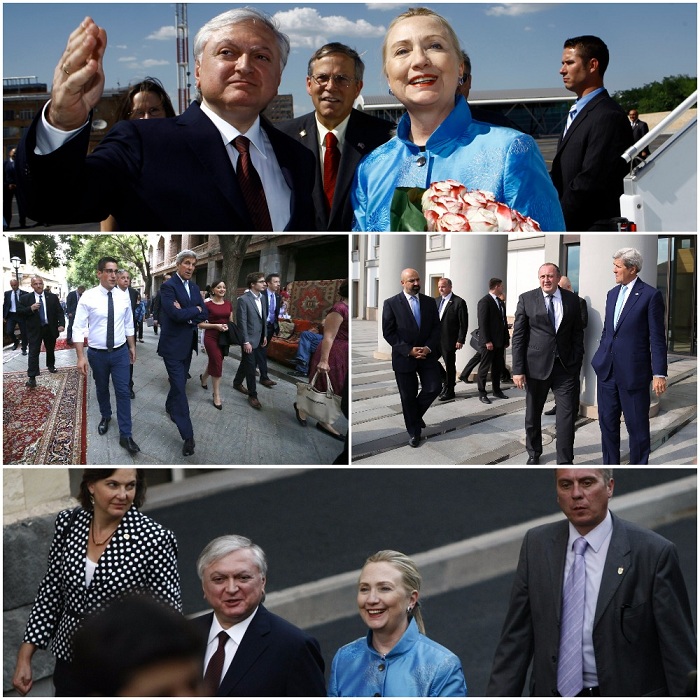Is Armenia’s diplomacy trying to break the tradition?
On July 6, US Secretary of State John Kerry arrived in Georgia. In Tbilisi, he took part in the regular plenary session of the US-Georgia Strategic Partnership Committee to discuss the priority directions of the Charter signed in 2009: democracy, defense and security, economy, relations between peoples. Kerry signed a memorandum of understanding with the Prime Minister of Georgia Giorgi Kvirikashvili on “Cooperation in defense and security”. The next stop of the US Secretary of State was Ukraine, and from there, he traveled to Warsaw to the NATO summit.
There were times when the US Secretary of State was also arriving in Yerevan. In July 2010, US Secretary of State Hillary Clinton visited Armenia along with five other countries. When being in Yerevan, she called Serzh Sargsyan a “courageous leader.” Later, in June 2012, Clinton visited Yerevan, Tbilisi and Baku.
The current US Secretary of State does not visit Armenia and Azerbaijan, and if we associate her not visiting Baku with the specific stance of the United Stated towards this country by the level of democracy in this country, then her not visiting Yerevan can be considered a serious diplomatic failure, especially after Aliyev’s unleashed four-day war in April. It could be flatter if the Armenian diplomacy had successful to bring the US Secretary of State to Yerevan and Tbilisi by ignoring Baku (to the point, according to Dmitry Peskov, Putin’s visit to Baku in August is pending). Many people would say that Washington has always maintained a balance towards Armenia and Azerbaijan and hardly it would break this tradition.
Read also
And has our diplomacy tried or is trying to break the traditions and come up with proactive measures that would not be agreed with Moscow and servicing the interests of the Kremlin?
Here, a logical question might arise: what should the US Secretary of State do coming to Armenia … On September 3, 2013, “courageous leader” Serzh Sargsyan made a statement on accession to the Customs Union and the Common Economic area.
Until recently, official Yerevan was always priding that the RA authorities manage to maintain balanced relations between the West and Russia and run an “and-and” policy. But as they say, the insiders and outsider do not believe these tales for the insiders and outsiders see what is going on and why it happens.
The authorities did everything and consistently continue doing so that Armenia is perceived as Russia’s attaché country, consequently, were should not be surprised that we would be more ignored in the near future.
Recently, Russian President Vladimir Putin addressed the issues of Russia’s foreign policy, saying that Russia intends to update the concept of foreign policy. In Putin’s words, ensuring international peace and stability would become a priority for Russia. He added that the Russian diplomacy should take a more active part in helping to settle current conflicts and prevent the emergence of new hotbeds of tension and conflict, especially along our borders, of course, strengthen sovereignty.
Putin has sent a congratulatory message to US President Barack Obama on the US Independence Day, particularly noting, “The history of Russian-American relations shows that when we act as equal partners and respect each other’s lawful interests, we are able to successfully resolve the most complex international issues for the benefit of both countries’ peoples and all of humanity.”
Where is Armenian headed to under Russia’s auspices? This question is really topical for what so far has been “donated” to Russia by Armenia apparently is not enough.
The strategic draft approved at the meeting of CSTO foreign ministers in Yerevan, by the words of Russian representative to the CSTO Viktor Vasilyev, will restate that NATO is a threat. “Certainly, one of the threats that we consider is NATO’s enlargement and approaching the borders of our states. Naturally, this will be mirrored in the strategy,” – said the Russian diplomat.
The Council session of the CSTO Foreign Ministers focused on the CSTO Collective Security Strategy-2025, which will be presented at the next Council session of the Collective Security Council for approval. This October, the presidents of the CSTO countries will come together in Yerevan, it is expected that the strategy will be adopted at this summit.
It is possible that Moscow, however, will refrain from the assessment that “NATO is a threat” but there is almost no doubt that if the Kremlin decides that such wording should be adopted, the official Yerevan will obediently obey this decision, without carefully weighing how afterwards it is going to continue its future relations with NATO.
Both viewing NATO as a threat and becoming a party in other processes of Russia-West confrontation contradicts Armenia’s interests. Moscow already views Armenia’s neighbor Georgia’s rapprochement policy to NATO against its own interests, and in this respect too, we can easily appear in a vulnerable situation.
To avoid this, it is necessary for the Armenian authorities to act in favor of Armenia and the RA citizens when making decisions, have their own strategy and security concept. Instead of saying endless speeches about “learning lessons” from the four-day war in April, it is just necessary to act.
EMMA GABRIELYAN


















































